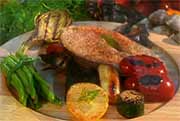- Are You Making This Expensive Thermostat Error This Winter?
- Recognizing the Signs of Hypothyroidism
- 10 Strategies to Overcome Insomnia
- Could Artificial Sweeteners Be Aging the Brain Faster?
- Techniques for Soothing Your Nervous System
- Does the Water in Your House Smell Funny? Here’s Why
- Can a Daily Dose of Apple Cider Vinegar Actually Aid Weight Loss?
- 6 Health Beverages That Can Actually Spike Your Blood Sugar
- Treatment Options for Social Anxiety Disorder
- Understanding the Connection Between Anxiety and Depression
Mouse Study Hints at How Mediterranean Diet Protects the Heart


Study after study has shown that a Mediterranean-style diet rich in fish, nuts, vegetables and fruits seems to lower your risk of heart trouble.
Now, a new mouse study hints at why.
“When unsaturated fatty acids, found in olive, nuts and fish oils, are eaten together with a source of nitrate or nitrite, found in vegetables such as beetroot and those with green leaves, they form nitro fatty acids in the body,” explained lead researcher Philip Eaton, a professor of cardiovascular biochemistry at Kings College London. Those fatty acids then lower blood pressure by inhibiting a particular enzyme.
The study is published online May 19 in the Proceedings of the National Academy of Sciences.
While the finding was made in animals and such results often can’t be duplicated in humans, Eaton thinks it would also happen in people because they have the same enzyme.
Eaton noted that although the finding is new, there is evidence that drugs that inhibit the enzyme might lower blood pressure and some pharmaceutical companies are working on developing such medications.
For the study, the researchers’ aim was to find out if inhibiting the enzyme was enough to lower blood pressure in the animals studied. They first created mice with a mutation that made the enzyme resistant to the effects of nitro fatty acids.
When they gave the mice an enzyme inhibitor, blood pressure decreased in wild mice but not in the mice with the resistant version of the enzyme. The inhibitor protected the wild mice from heart damage in a mouse model of high blood pressure, but did not protect the re-engineered mice. When they fed the mice the food in the Mediterranean diet that combine to make nitro fatty acids, the enzyme was again inhibited in the wild mice, but not the re-engineered mice.
“This study provides insights on the mechanics behind how eating vegetables aids in the reduction of risk of [high blood pressure],” said Connie Diekman, director of university nutrition at Washington University, St. Louis. Diekman was not involved with the study.
Whether the same mechanism occurs in people needs more investigation, she added. However, Diekman said, previous human trials have shown that similar blood pressure-lowering effects occur when plant foods and unsaturated fats are eaten together.
The study reinforces why foods, not supplements, are important in the reduction of disease risk, Diekman noted.
One of the study co-authors reports involvement in Complexa Inc., a Pittsburgh-based company developing nitro fatty acids for therapeutic applications. Preliminary U.S. Food and Drug Administration-approved research is underway to test the safety of those fatty acids, Eaton said.
More information
To learn more about eating a Mediterranean-style diet, visit the American Heart Association.
Source: HealthDay
Copyright © 2026 HealthDay. All rights reserved.










